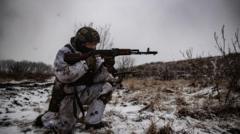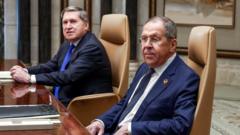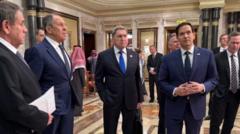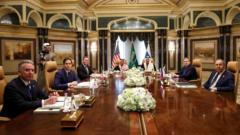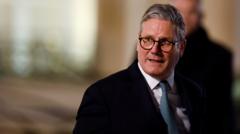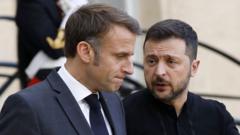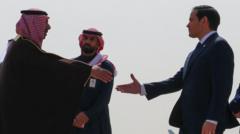In a call-to-action during the Munich Security Conference, Zelensky has highlighted the urgency of establishing an independent European army to bolster defense against potential threats, particularly from Russia, in light of evolving U.S. foreign policy dynamics.
**Zelensky Advocates for Formation of European Military Alliance**
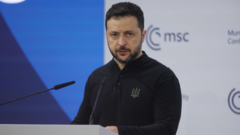
**Zelensky Advocates for Formation of European Military Alliance**
Ukrainian President Volodymyr Zelensky emphasizes the need for a united European military force amid shifting geopolitical alliances.
---
Ukrainian President Volodymyr Zelensky has made a compelling case for the establishment of an "army of Europe" to strengthen European defense capabilities, particularly in safeguarding against Russian aggression. During the Munich Security Conference, Zelensky articulated concerns regarding the potential waning of U.S. support for Europe, suggesting that the continent must prepare for a new security landscape.
Addressing the audience, Zelensky remarked, "I really believe the time has come - the armed forces of Europe must be created," stressing that Europe can no longer rely solely on American military support. The discussions at the conference also echoed sentiments from U.S. Vice President JD Vance, who noted that it was imperative for Europe to significantly enhance its defense efforts.
Zelensky's comments come on the heels of conversations between U.S. President Donald Trump and Russian President Vladimir Putin, shedding light on the necessity for transparency and inclusion in peace negotiations involving Ukraine. The Ukrainian leader vehemently asserted, “Ukraine will never accept deals made behind our backs without our involvement,” underlining the importance of Ukraine's active participation in discussions that impact its sovereignty.
The dialogue surrounding a unified European military is not new, with leaders such as French President Emmanuel Macron having advocated for a reduced dependence on U.S. military support in favor of a more autonomous European defense initiative. Zelensky referred to recent discussions, stating, "A few days ago, President Trump told me about his conversation with Putin. Not once did he mention that America needs Europe at the table - that says a lot."
As the conflict in Ukraine approaches its third anniversary, geopolitical analysts note that the prospect of Ukraine gaining NATO membership remains uncertain, with U.S. Defense Secretary Pete Hegseth reinforcing this view. Hegseth also noted that the aspiration of reverting to Ukraine's pre-2014 borders appears increasingly unrealistic. Despite the challenges, Zelensky maintains that NATO membership for Ukraine remains on the table, indicating a persistent commitment to his nation's defense alliances.
In an era of shifting alliances and emerging threats, Zelensky's call to action resonates in the context of the ongoing war in Ukraine and a reevaluation of the foundational defense structures within Europe. The conversation about a collective military capability is likely to influence future discourse on international security within the continent.
Ukrainian President Volodymyr Zelensky has made a compelling case for the establishment of an "army of Europe" to strengthen European defense capabilities, particularly in safeguarding against Russian aggression. During the Munich Security Conference, Zelensky articulated concerns regarding the potential waning of U.S. support for Europe, suggesting that the continent must prepare for a new security landscape.
Addressing the audience, Zelensky remarked, "I really believe the time has come - the armed forces of Europe must be created," stressing that Europe can no longer rely solely on American military support. The discussions at the conference also echoed sentiments from U.S. Vice President JD Vance, who noted that it was imperative for Europe to significantly enhance its defense efforts.
Zelensky's comments come on the heels of conversations between U.S. President Donald Trump and Russian President Vladimir Putin, shedding light on the necessity for transparency and inclusion in peace negotiations involving Ukraine. The Ukrainian leader vehemently asserted, “Ukraine will never accept deals made behind our backs without our involvement,” underlining the importance of Ukraine's active participation in discussions that impact its sovereignty.
The dialogue surrounding a unified European military is not new, with leaders such as French President Emmanuel Macron having advocated for a reduced dependence on U.S. military support in favor of a more autonomous European defense initiative. Zelensky referred to recent discussions, stating, "A few days ago, President Trump told me about his conversation with Putin. Not once did he mention that America needs Europe at the table - that says a lot."
As the conflict in Ukraine approaches its third anniversary, geopolitical analysts note that the prospect of Ukraine gaining NATO membership remains uncertain, with U.S. Defense Secretary Pete Hegseth reinforcing this view. Hegseth also noted that the aspiration of reverting to Ukraine's pre-2014 borders appears increasingly unrealistic. Despite the challenges, Zelensky maintains that NATO membership for Ukraine remains on the table, indicating a persistent commitment to his nation's defense alliances.
In an era of shifting alliances and emerging threats, Zelensky's call to action resonates in the context of the ongoing war in Ukraine and a reevaluation of the foundational defense structures within Europe. The conversation about a collective military capability is likely to influence future discourse on international security within the continent.


